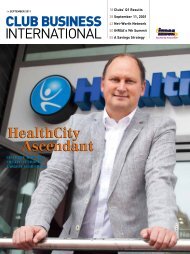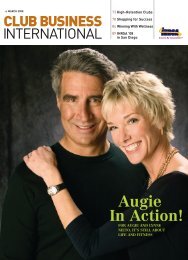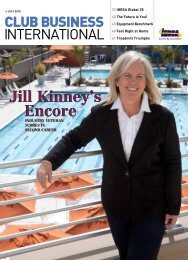CBE Winter Report.qk - IHRSA
CBE Winter Report.qk - IHRSA
CBE Winter Report.qk - IHRSA
Create successful ePaper yourself
Turn your PDF publications into a flip-book with our unique Google optimized e-Paper software.
Interview We will work with our partners<br />
in their respective markets to share best practices<br />
to clearly position themselves and deliver<br />
a product that their target consumers<br />
desire and value.<br />
In addition, results-orientated programmes,<br />
such as weight loss, are on the rise. People<br />
are very willing and eager to pay three or<br />
five times the amount that they’d normally<br />
pay for a monthly membership if they see<br />
results. Co-pay programmes and subsidies<br />
from insurance companies are also becoming<br />
more common. However, insurers are<br />
requiring proof of qualified staff. Thus,<br />
certification will be increasingly important.<br />
<strong>CBE</strong>: Do you foresee any standards legislation<br />
coming from the EU on this, or is it<br />
more likely to happen on a country-bycountry<br />
basis?<br />
HM: I see it happening country by country,<br />
initially. European-wide legislation will<br />
follow later.<br />
<strong>CBE</strong>: What about VAT?<br />
HM: High or low, VAT affects the net amount<br />
that a club receives from the member.<br />
For example, Austria has a VAT of 20%;<br />
Germany is at 19%. Some countries, such as<br />
Back to the Future<br />
Belgium and, I believe, Sweden, have<br />
a reduced VAT. This is a tremendous<br />
advantage because they have to pay less<br />
tax up front to the government.<br />
There is a law in the EU that allows<br />
countries to decide whether a lower rate<br />
of VAT, which now applies to necessities<br />
such as groceries, can be applied to<br />
health club memberships as well.<br />
Once lobbying becomes more concerted<br />
and more professional in Europe, we will<br />
see more countries understanding that<br />
creating an incentive for prevention, with<br />
a reduced VAT on health club memberships,<br />
will benefit health, as well as have<br />
a positive impact on club net revenue<br />
and profitability.<br />
<strong>CBE</strong>: The newly published<br />
2007 <strong>IHRSA</strong> European Market<br />
<strong>Report</strong>: The size and the scope<br />
of the health club industry<br />
shows that market penetration<br />
rates range from 16.4%<br />
in the Netherlands to 3.4% in<br />
Russia. What do clubs need<br />
to do to improve these rates?<br />
Hans Muench is well-known to many <strong>IHRSA</strong> members—for good reason. He<br />
has had a long and varied career in the industry, and, by selecting him as the<br />
new Director, Europe, <strong>IHRSA</strong> has returned to its roots.<br />
Muench first became involved with <strong>IHRSA</strong> in 1984 when he was working on an<br />
<strong>IHRSA</strong>-sponsored study of the European club industry as part of his MBA thesis. He<br />
received his degree in international business from the University of South Carolina<br />
in 1985. In 1994, he became <strong>IHRSA</strong>’s first director of international development,<br />
and worked out of the association’s US office in Boston, where he established the<br />
foundation and strategy for its international activities. He returned to Germany with<br />
his family in 1999.<br />
A German citizen who is based in Munich, Muench speaks fluent German, French<br />
and English. He has a rich history in the fitness industry, ranging from chief<br />
development officer of a small chain of health clubs to senior executive positions in<br />
major fitness equipment companies, including Life Fitness Europe. Before rejoining<br />
the <strong>IHRSA</strong> staff this year, he was Area Manager for Nautilus in Germany/Austria.<br />
“We spent the summer months talking to our European members and<br />
partners to learn more about their needs to help us determine the qualities and<br />
skills that were necessary in this position,” said Joe Moore, president of <strong>IHRSA</strong>.<br />
“Hans embodies what we were looking for, and we are thrilled to have him back<br />
on the team.”<br />
16 Club Business Europe � JANUARY/FEBRUARY 2008 � www.ihrsa.org<br />
HM: Each club must reach out to its<br />
target consumers and create an image<br />
that attracts this group. For more people<br />
to consume our product, the perception<br />
among consumers must improve.<br />
In addition, income levels must rise in<br />
developing markets so that the general<br />
population can afford to make monthly<br />
membership payments.<br />
<strong>CBE</strong>: The 2007 <strong>IHRSA</strong> European Market<br />
<strong>Report</strong> also details 2006-2007 mergers and<br />
acquisition activity. In your view, what do clubs<br />
need to do to attract more Private Equity?<br />
HM: We need to raise our level of professionalism<br />
by recruiting talent from<br />
outside the fitness industry.<br />
Also, if we collect better numbers,<br />
track our growth and communicate<br />
our message better, it<br />
will help investors make the<br />
decision to invest with us.<br />
For example, how many<br />
potential investors know that,<br />
for the last 20+ years, our<br />
industry has grown consistently,<br />
while proving itself to be<br />
recession resilient?<br />
<strong>CBE</strong>: What does the industry need to do<br />
to work more closely with the medical<br />
community?<br />
HM: Europe needs to have a basic level<br />
of club standards and certification to<br />
demonstrate to the medical community<br />
that we are part of the solution and<br />
professional enough to be a trusted part<br />
of their industry. We must also address<br />
the issue of competitiveness, and our<br />
industry taking away patients from doctors,<br />
hospitals and insurance companies.<br />
<strong>CBE</strong>: In your view, how can the industry<br />
become more “professional” in the eyes of<br />
the press and various governments?<br />
HM: <strong>IHRSA</strong> is helping clubs present<br />
themselves better with studies, statistics<br />
and strategies. Leading clubs should<br />
know their various representatives and<br />
be in touch with them on a regular basis.

















